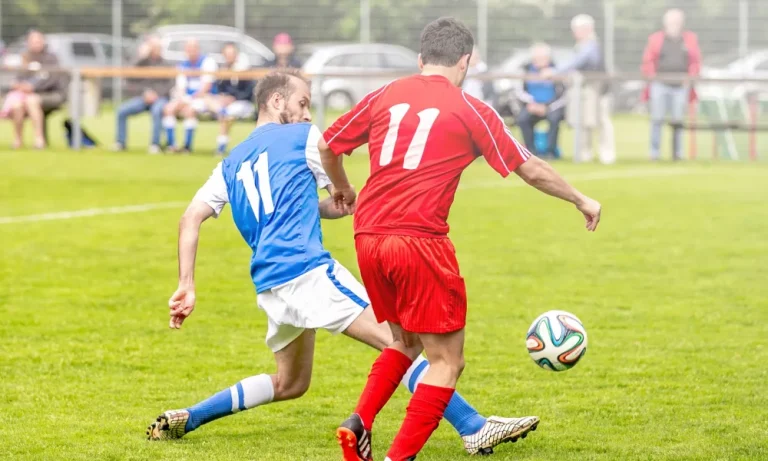What Is the Delay of Game in Football?
Delay of the game is a common penalty in football that occurs when the offense fails to initiate a play within the allotted time. It’s like getting caught snoozing when the alarm goes off!
This blog post will unravel the mystery behind this penalty, explaining its consequences, reasons, and strategies to avoid it. So, let’s dive into the world of delay of games in football!
What Is the Delay of Game in Football?
In football, a delay of the game occurs when the offense fails to start a play within the specified time limit. Its purpose is to ensure a fair and efficient game flow, preventing teams from intentionally wasting time or gaining an unfair advantage.
Conditions Leading to Delay of Game Penalty
Several conditions can lead to a delay of game penalty. These include the offense not snapping the ball before the play clock expires, intentionally stalling to disrupt the defense’s strategy, or failing to get set in the proper formation before the snap.
The Role of Game Clock and Play Clock
The game clock and play clock play crucial roles in the delay of the game penalty. The game clock determines the overall time available for each half, while the play clock sets the time limit for the offense to initiate a play once the previous play has ended.
These clocks ensure the game progresses smoothly and allow both teams an equal opportunity to execute their plays.
Reasons for a Delay of Game
When it comes to the delay of game penalties in football, various scenarios can lead to this infraction. Understanding these common situations and the responsibilities of the offense is crucial in avoiding this penalty and maintaining a smooth game flow.
Highlighting Common Scenarios
Several situations can result in a delay of game penalty. One common scenario is when the offense takes too long to snap the ball after the play clock has started. This could happen due to miscommunication, confusion, or a lack of awareness of the time remaining.
Responsibilities of the Offense
The offense holds the primary responsibility for avoiding a delay of game penalty. They need to be organized, focused, and efficient in their play calling and execution. The quarterback plays a pivotal role in managing the play clock, ensuring the offense is ready to snap the ball promptly.
Consequences of Delay of Game
A delay of game penalty in football can have significant consequences for the offense, impacting the game in terms of yardage, time, and even possession. Understanding these consequences and their strategic implications is key for both teams involved.
Consequences for the Offense
When a delay of game penalty is called against the offense, they face several consequences. Firstly, they incur a five-yard penalty, pushing them back closer to their end zone. Additionally, it results in a loss of down, meaning they do not get another opportunity to execute the previous play.
Impact on the Game
The impact of a delay of game penalty goes beyond the immediate yardage loss. It also affects the game in terms of time management. The clock continues to run, consuming valuable seconds that could have been used to execute plays and potentially score points.
Furthermore, a delay of game penalty can have a domino effect on the overall flow of the game. It disrupts the offensive rhythm, giving the defense an advantage and potentially shifting the momentum. This strategic implication can greatly influence the outcome of the game.
Strategic Implications and Outcome
For the offense, a delay of game penalty forces them to play catch-up. They need to regain the lost yardage and make up for the lost down, which can be challenging. On the other hand, the defense gains an opportunity to apply more pressure and disrupt the offensive strategy.
In close games, a delay of game penalty can be a game-changer. It can stall a potential scoring drive for the offense or provide the defense with a crucial advantage. The outcome of the game can hinge on the ability of both teams to manage the play clock effectively and avoid this penalty.
Strategies to Avoid Delay of Game
Preventing a delay of game penalty requires effective strategies and techniques from the teams involved. From coaching to communication and time management, there are practical tips that can help teams excel in managing the play clock and avoiding this costly penalty.
Coaching and Communication
Coaching plays a crucial role in ensuring that the offense is well-prepared and disciplined. Coaches should emphasize the importance of time management and reinforce the consequences of a delay of game penalty. Clear communication between coaches and players is essential, allowing for efficient play calls and adjustments at the line of scrimmage.
Time Management Techniques
Teams can employ various time management techniques to avoid the delay of game penalties. One effective approach is establishing a rhythm and tempo in their offensive plays. By practicing quick transitions and maintaining a sense of urgency, teams can ensure they are ready to snap the ball promptly.
Learning from Successful Teams
There are teams known for their exceptional ability to manage the play clock and avoid delay of game penalties.
The New England Patriots, under the leadership of Coach Bill Belichick and quarterback Tom Brady, have been renowned for their efficiency and discipline in this aspect. Their attention to detail and precise execution serve as a model for other teams.
Other successful teams prioritize time management by utilizing non-verbal communication, such as hand signals and visual cues. This helps streamline the play-calling process and minimizes the risk of miscommunication or confusion.
FAQs – What Is Delay of Game in Football
1: How much time does the offense have to snap the ball before a delay of game penalty is called?
The offense must snap the ball within 40 seconds of the previous play ending or 25 seconds from when the play clock is reset by the officials.
2: Can the defense force a delay of game penalty on the offense?
No, only the officials have the authority to call a delay of game penalty. The defense can try to disrupt the offense’s rhythm and cause confusion, but they cannot directly cause a delay of game penalty.
3: What are the consequences of a delay of game penalty for the offense?
The offense incurs a five-yard penalty, pushes them closer to their end zone, and loses a down, meaning they do not get another opportunity to execute the previous play.
4: Can a delay of game penalty result in a loss of possession for the offense?
While a delay of game penalty does not directly result in a loss of possession, it can contribute to time mismanagement, potentially leading to a turnover on downs or forcing the offense to punt the ball.
Conclusion
Understanding what a delay of game penalty is in football is essential for players, coaches, and fans alike. It occurs when the offense fails to snap the ball within the allotted time, resulting in consequences such as yardage loss, time mismanagement, and potential loss of possession.
By implementing effective strategies, teams can avoid this penalty and maintain a smooth game flow. So, remember to manage the play clock wisely and keep the game moving!





